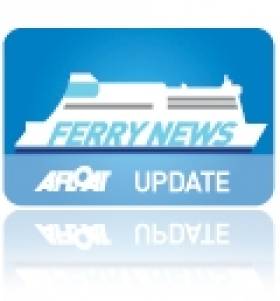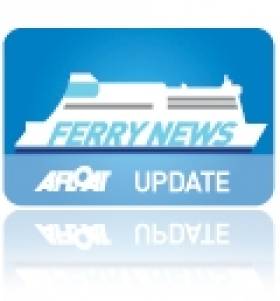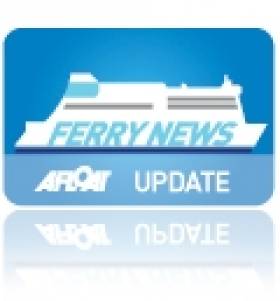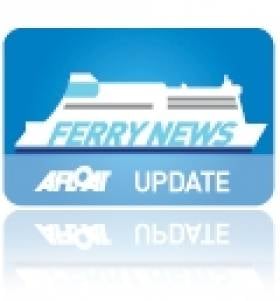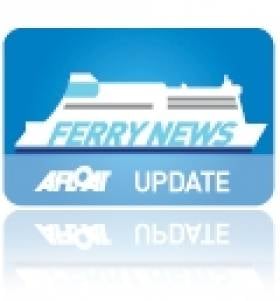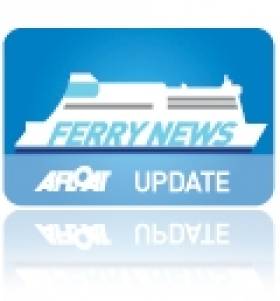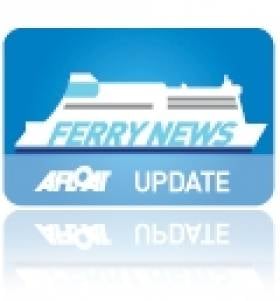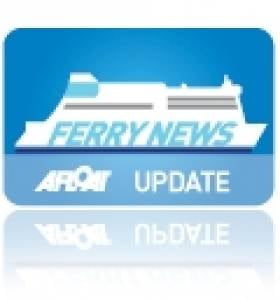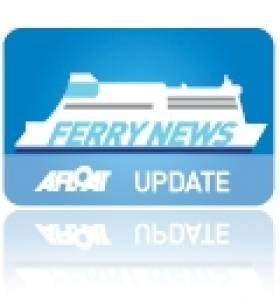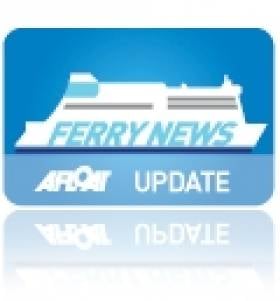Displaying items by tag: Stena Line
#FERRY NEWS – A £4m upgrade of Stena Line's Belfast-Birkenhead (Liverpool) sisters has been completed at Harland & Wolff. The work was carried on the pair of 27,000 tonnes ships by Newry based specialist marine outfitters MJM Marine, writes Jehan Ashmore.
Work on the 980-passenger vessels Stena Mersey and Stena Lagan began in March and ended last month. During that timeframe the Stena Feronia which was in a collision with a cargoship in Belfast Lough, was deployed to cover the overhaul of the sisters, now sporting Stena Line livery.
The investment programme introduced on board entails facilities such as a lounge pod-area featuring several iMacs, a trucker's lounge, free wi-fi and a bar & grill and a restaurant.
In addition the refurbishment has improved customer experience with the inclusion of an improved shop, improved guest services, and cinema offering guests free movies during the north Irish Sea crossing.
The pair built by Visentini, the Italian shipbuilder based near Venice, can handle 2,662 freight lane metres are now owned by a subsidiary of Stena Line, in the form of Stena RoRo which purchased the vessels from a German bank.
Beforehand the ferries were part of Epic Shipping which chartered them in turn to DFDS Seaways. The Danish owned operator's short-lived Irish Sea route network venture was sold last year to Stena which included the sisterships.
Stena RoRo also purchased the Visentini built ro-pax Watling Street and also from the same yard the former Celtic Link ro-pax Norman Voyager, which is currently back on its original Portsmouth-Le Havre route running on charter to French ferry operator LD Lines.
Meanwhile Celtic Link's existing Rosslare-Cherbourg route vessel Celtic Horizon, is on a five year charter from an offshoot of the same Italian shipbuilder and again is another vessel of the successful ro-pax design.
Seasonal Start for Three In A Row
#FERRY NEWS – By this weekend three seasonal-only operated routes from the island of Ireland will have resumed service since the recent change of the clocks marking the start of summertime, writes Jehan Ashmore.
Sailings started today on Stena Line's Dun Laoghaire-Holyhead (120 minutes) fast-craft HSS Stena Explorer operated service. The central corridor route closed last September due to cost-saving measures as previously reported. For further details on sailing schedule click HERE.
The reopening of the Welsh route follows yesterday's launch of P&O Ferries fast-craft sailings to Scotland between Larne-Troon (2 hours) served by the 92m Express. She also runs additional sailings on the year-round Larne-Cairnryan route served by a pair of conventional ferry sisters. To read more information on both sailing route schedules click HERE.
The remaining route to re-open is Brittany Ferries Cork-Roscoff (14 hours) service operated by the 2,400 passenger 'flagship' Pont-Aven, which features an indoor swimming pool. Her first sailing for this year is tonight's sailing from the Breton port.
The corresponding Irish sailing departs tomorrow afternoon and the inaugural round trip is due to be completed with an arrival in France on Sunday morning. For sailing times click HERE.
National Ferry Fortnight Launched
#FERRY FORTNIGHT – With today's St. Patrick's Day festivities, the national event also coincides with the launch of our nearest neighbour's National Ferry Fortnight (17th-30th March) campaign held in the UK, writes Jehan Ashmore.
Each year around 13m people travelled between the UK and Ireland while more than 10m people took to the skies.
The UK has an extensive ferry network of approximately 50 routes including those serving the islands. Of the 11 shipping operators that are members of the Passenger Shipping Association (PSA), five of them serve on routes to Ireland.
Those participating in the ferry campaign which operate on the Irish market are Brittany Ferries, Irish Ferries, Isle of Man Steam Packet Company, P&O and Stena Line.
To read more about all the ferry firms participating in the National Ferry Fortnight campaign click HERE.
Dun Laoghaire-Holyhead Service to Start Earlier than Planned
#FERRY NEWS- Stena Line have changed the resumption date of Dun Laoghaire-Holyhead HSS fast-craft operated sailings to 30th March, two days earlier than originally planned and as previously reported on Afloat.ie
The seasonal-only service is to operate a daily single round trip with a 10.00 hours sailing from Holyhead and a 13.15 hours sailing from Dun Laoghaire. Sailing times are 120-minutes and they will run throughout the summer months until 11th September.
Stena Line's Head of PR and Communications, Diane Poole, OBE said: "We look forward to welcoming the HSS Stena Explorer back on the Dun Laoghaire to Holyhead route which will provide customers with even more reason to cross the Irish Sea during the summer months.
"The vessel, which offers excellent onboard facilities, will complement the timetable on our Dublin Port to Holyhead route as it offers customers a mid-morning departure from Holyhead and a lunchtime departure from Dun Laoghaire."
For more information visit www.stenaline.ie or call 01 204 7777
Early Start for 'Ferry Fortnight'
#FERRY NEWS – St.Patrick's Day coincides with the start of the UK's annual National Ferry Fortnight (17-30 March) campaign which includes the participation of over 50 routes, including those operating on the Irish Sea, writes Jehan Ashmore.
This year's event organised by the Passenger Shipping Association (PSA) is to be brought forward two months earlier instead of May. According to the PSA the change of dates was designed to "emphasise the great value of family ferry travel at a time when parents have a watchful eye on budgets".
A new official logo will front the campaign's website www.discoverferries.com which is supported by all ferry line members of the association. The two week showcase aims to heighten consumer and media awareness of the UK's extensive ferry firms route network.
PSA members include Brittany Ferries, Condor Ferries, DFDS Seaways, Hovertravel, Isle Of Man Steam Packet Company, Irish Ferries, LD Lines, P&O Ferries, Red Funnel, Stena Line and Wightlink.
The association estimate that around 35 million people, 8 million cars and 140,000 coaches were carried by ferries last year.
Captain Arrested after Belfast Lough Collision
#FERRY NEWS - The captain of the 1,500 tonnes cargo vessel Union Moon which was involved in a collision with the passenger ferry Stena Feronia in Belfast Lough last night, has been arrested by police, according to BBC News.
An investigation is under way after the accident which happened about a mile and a half from shore between Carrickfergus and Helen's Bay.
The 27,000 tonnes Stena Feronia was on its way from Birkenhead, Merseyside, to Belfast when the collision happened at about 19:45 GMT.
Coxswain of Donaghadee Lifeboat Philip McNamara said the Union Moon, was brought back to Belfast.
No one was injured, but both vessels were substantially damaged. The Maritime and Coastguard Agency (MCA) said both captains had been breathalysed, to read more about this story click HERE.
Vessels Collide in Belfast Lough
#FERRY NEWS – A passenger ferry and cargo vessel collided in Belfast Lough last night and there are no reports of any injuries. The incident happened close to the Fairway buoy about a mile and a half from shore between Carrickfergus and Helen's Bay, according to BBC News.
It is understood that the ferry Stena Feronia (1997/21,856grt) has now docked at the Stena terminal. The other vessel - a cargo ship, the Union Moon (1985/1,543grt)- was accompanied by the coastguard as it was brought back to Belfast.
The ferry was on its way from Birkenhead, Merseyside, to Belfast when the collision happened, to read more on this story click HERE.
Ferry Operator Consider Court Finding
#FERRY NEWS – Senior managers in Stena Line are considering today the implications of a Labour Court recommendation that it increase redundancy terms for 39 workers at its Dún Laoghaire Harbour operation, the Irish Times reports.
The Labour Court rejected the workers' claim for automatic redeployment from the Dún Laoghaire service to Stena's Dublin Port – Holyhead route operation.
Stena's Dublin Port operation is managed by a subcontractor RoRo Services Dublin Ltd, which Stena said had no vacancies.
The ferry company has said the Dún Laoghaire -Holyhead service, which is now seasonal, will reopen in April, as previously reported on Afloat.ie. However, the company told the Labour Court there is currently no work for staff in the south Dublin port.
Workers who are members of SIPTU have been seeking redeployment to Dublin Port or enhanced redundancy payments.
However, while the Labour Court did recommend enhanced redundancy payments, the enhancement is less than that sought by the workers.
In previous redundancies at the company offered three weeks' pay per year of service, inclusive of statutory redundancy. In addition, they had received ex-gratia payments of €18,000 plus an additional €500 per year of service. The Labour Court recommended the €500 per year of service payment should be increased to €1,050 per year of service.
The Labour Court recommended that the company confirm staff in Dún Laoghaire would be given first call on jobs when the Dún Laoghaire service resumes in April.
A Stena spokesperson said senior management at the company were considering the recommendation and would make a statement later in the day.
Bad Weather Continues to Disrupt Ferry Sailings
#FERRIES - As the adverse weather continues, ferry services across the Irish Sea remain affected, with several crossings cancelled, writes Jehan Ashmore.
Irish Ferries 08.05hrs sailing this morning from Dublin to Holyhead operated by Isle of Inishmore, departed over three hours later than her scheduled time.
Last night she had just been deployed on the route so to cover sailings usually operated by Ulysses, which went off-service for annual dry-docking at Cammell Laird, Birkenhead, as previously reported on Afloat.ie
In addition the fast-ferry craft sailing at 08.45hrs from Dublin Port served by the Jonathan Swift were cancelled and the following sailings are also cancelled:
Dublin -Holyhead 14.30hrs
Holyhead-Dublin 12.00hrs AND 17.15hrs
Passengers booked on the Jonathan Swift instead will be accommodated on the Isle of Inishmore. For further information on Dublin-Holyhead sailing updates click HERE.
On the Rosslare-Pembroke Dock service, sailings were too cancelled with last night's sailing from Wales, which are currently served by Oscar Wilde. She sailed as scheduled with this morning's 08.45hrs sailing to Pembroke Dock.
To keep updated on Rosslare-Pembroke Dock sailings click HERE.
For further information, Irish Ferries Central Reservations contact: 0818 300 400 and for Irish Ferries, Rosslare Harbour contact: 00353 53 9133158
STENA LINE
For information on sailing schedules and updates from the company's Ferrycheck facility click HERE.
To contact Stena Line call: 003531 204 77 99 when travelling to Britain or 0044 (0) 8705 755 755 when travelling to Ireland or Scotland
P&O FERRIES
Dublin to Liverpool sailing at 1500hrs is cancelled and passengers will be accommodated on either 2130hrs tonight or 0900hrs on Friday 6th January.
For other sailings and on the Larne-Cairnryan click HERE and to contact +44 (0) 871 66 44 777 if calling from UK
OR (01) 407 34 34 if calling from ROI. In addition to latest sailing infomation on +44 (0)845 832 8888
FOR OTHER FERRY OPERATORS
Please click this LINK and choose the relevant highlighted ferry route for further information.
Dublin Route Reduced to Single-Ship Service
#FERRIES – Stena Line's two-ship operated Dublin-Holyhead route is to be reduced to a single vessel service as from tomorrow, due to annual dry-docking requirements, writes Jehan Ashmore.
Stena Nordica (2000/24,206grt) is to go off the route for a refit from 5th-19th January. The last sailing scheduled for the ferry will be from Dublin Port at 02.15hrs on 5th January. She is scheduled to return on the 3 hour 15 minute route on 19th January with the 16.00hrs sailing from the capital.
Fleetmate Stena Adventurer will continue operating to her normal schedule while the Japanese ro-pax vessel is away for the dry-docking period. For information on route sailings schedules click HERE.
During the off-peak winter season, particularly during the months of January and February, it is common practice for ferry operators to take vessels off-service for annual dry-docking.
In addition to Stena Line, rivals Irish Ferries today started a fleet logistic operation as vessels are taken off and on routes for dry-docking and replaced with temporary tonnage, as previously reported on afloat.ie



























